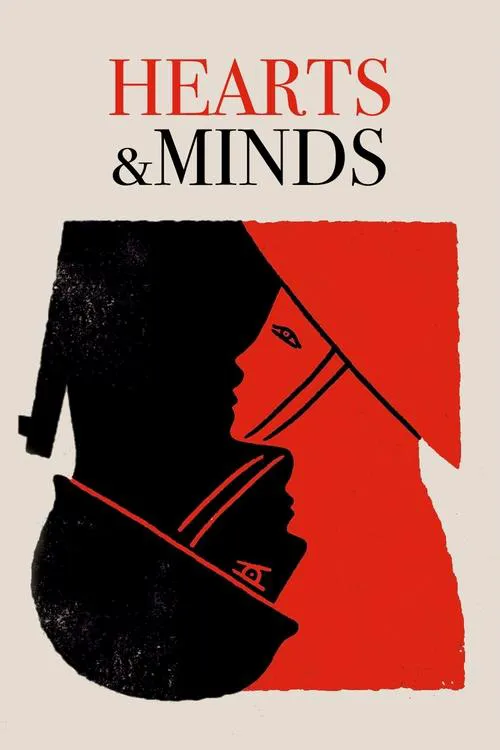Hearts and Minds

Plot
Hearts and Minds, released in 1974, is a searing anti-war documentary directed by Peter Davis that provides a scathing critique of the United States' involvement in the Vietnam War. The film takes its title from a phrase famously uttered by President Lyndon B. Johnson, which suggests that the key to victory in Vietnam lay in winning the support and affection of the Vietnamese people. However, Davis uses this phrase with a twist of irony, highlighting the stark contradiction between the optimistic rhetoric of the war's backers and the brutal reality on the ground. The film opens with the phrase "War and the American Identity" etched across the screen, setting the tone for the rest of the documentary. Davis begins by showcasing the United States' involvement in Vietnam, from the early days of the conflict to the height of the war in the early 1970s. Through a combination of archival footage, newsreels, and interviews with military personnel, he paints a picture of a nation convinced of its own moral superiority and destined to succeed in the fight against communism. One of the first interview subjects is General William C. Westmoreland, the U.S. Army's Chief of Staff, who expresses unwavering confidence in the American military's ability to win the war. Westmoreland's words are echoed by other high-ranking officials, including Secretary of Defense Robert McNamara and President Johnson himself, who all share a deep conviction in the righteousness of the American cause. Davis's inclusion of these interviews serves as a stark reminder of the gap between the U.S. military's stated objectives and the harsh realities on the battlefield. As the documentary progresses, Davis's focus shifts to the brutal realities of modern warfare. He presents a collection of shocking and disturbing images, including graphic footage of the effects of agent orange, which was widely used by the U.S. military to defoliate the Vietnamese countryside. The film also includes harrowing accounts from American soldiers who struggled with the psychological strain of participating in a war that seemed increasingly futile and morally dubious. Davis's use of juxtaposition is a powerful tool throughout the documentary. He pairs the upbeat, patriotic rhetoric of the war's supporters with the stark reality of violence and suffering on the ground. The result is a jarring and uncomfortable tension that underscores the contradictions at the heart of American involvement in Vietnam. Whether it's the contrast between the U.S. military's promises to "win the hearts and minds" of the Vietnamese people and the widespread destruction inflicted on their country, or the difference between the patriotic fervor of American soldiers and the trauma they suffered in the face of enemy fire, Davis skillfully highlights the dissonance between the idealized version of the war and the brutal, messy reality. Hearts and Minds is also notable for its willingness to challenge the dominant narrative surrounding the Vietnam War. Davis rejects the notion that the conflict was a noble and necessary struggle against communist aggression, opting instead to emphasize the complexities and uncertainties of the war. He presents the views of anti-war activists and Vietnamese civilians who were impacted by the conflict, as well as soldiers who began to question the justification for American involvement. One of the most striking aspects of the documentary is its use of music. Davis incorporates a range of songs, from patriotic anthems to protest rock, to create a sonic backdrop that underscores the contradictions and tensions of the war. The inclusion of folk singer Joan Baez's rendition of "Joe Hill" is particularly poignant, highlighting the struggles of American soldiers and the moral ambiguities of the war. Throughout the documentary, Davis's own perspective is largely absent. He avoids grandstanding or editorializing, instead allowing the footage and interviews to speak for themselves. This approach adds to the film's effectiveness, creating a sense of objectivity and detachment that underscores the gravity of the issues at stake. The release of Hearts and Minds in 1974 coincided with a growing national awareness of the devastating consequences of U.S. involvement in Vietnam. The film was widely praised by critics and audiences alike, with many hailing it as a powerful and unflinching critique of American foreign policy. Hearts and Minds earned four Academy Awards, including Best Documentary Feature, and cemented its place as a landmark of anti-war filmmaking. Even today, the documentary remains a potent reminder of the consequences of unchecked military power and the importance of critically evaluating the motives and actions of those in positions of authority.
Reviews
Recommendations




